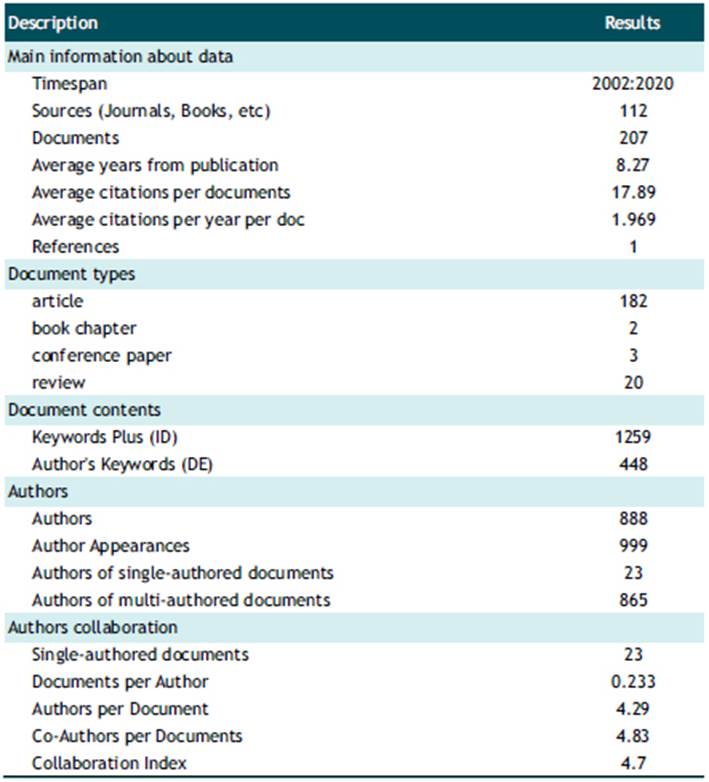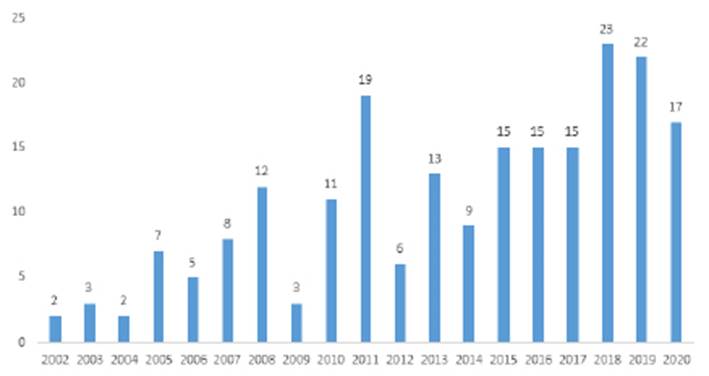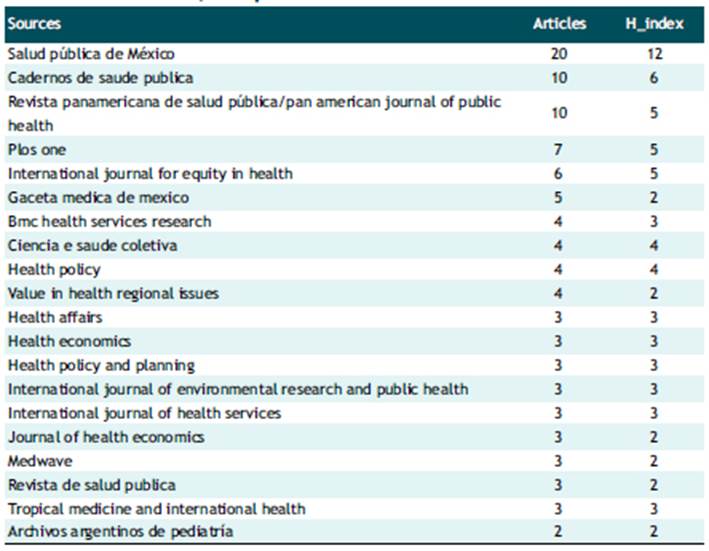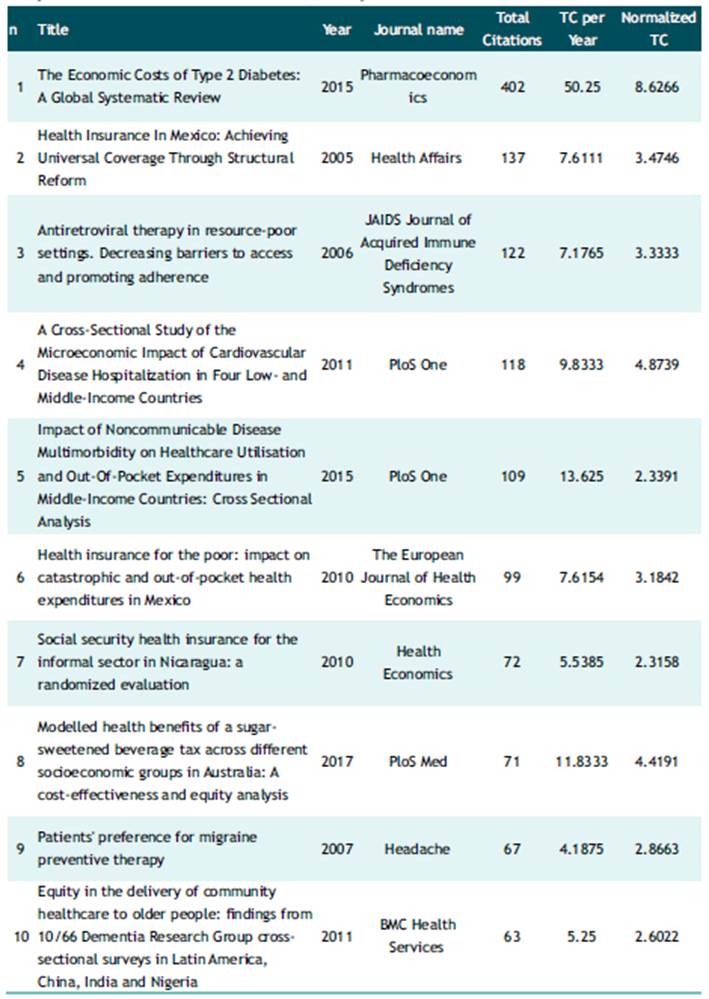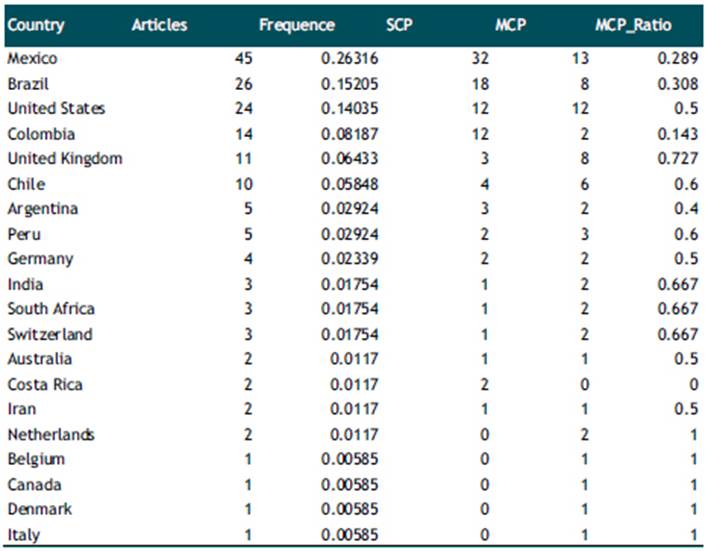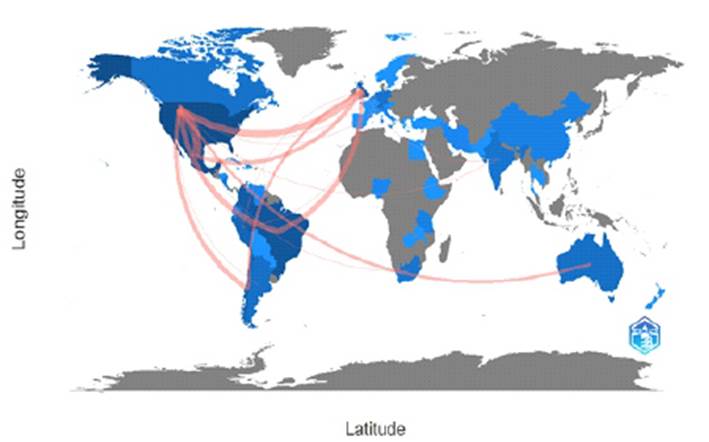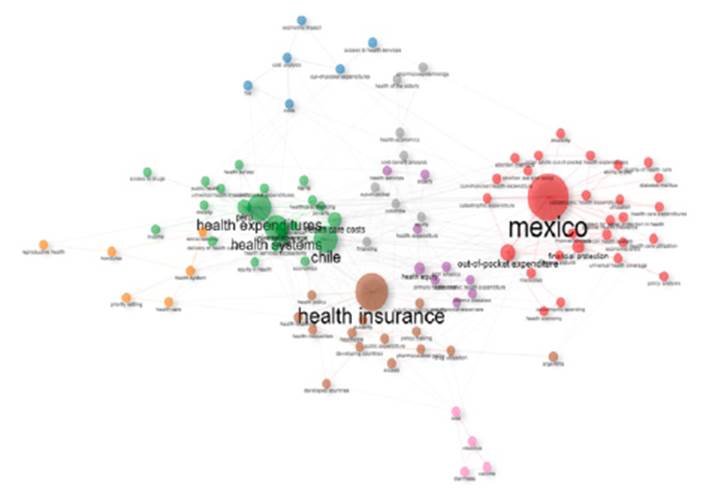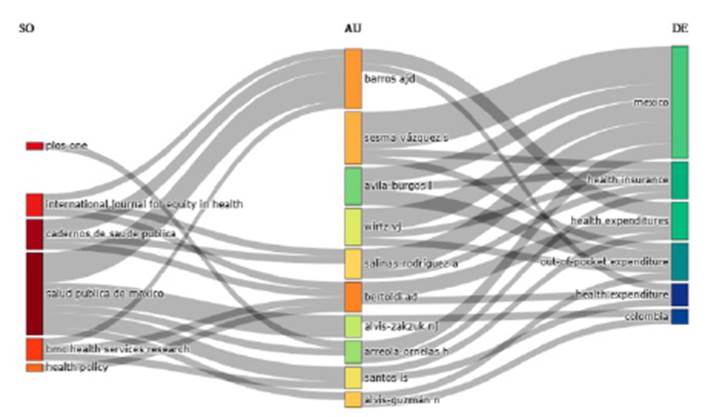Introduction
According to the World Health Organization, achieving universal health coverage and protection against financial risks are indicators to guarantee a better quality of life and greater well-being1,2. However, despite efforts, in low- and middle-income countries, resources for adequate health care are insufficient to ensure that all people have equal access to health services3,4. These coverage problems would force the population to cover part of the expenses associated with their medical care, which can create financial difficulties by forcing people to choose between their health expenses and other needs1.
The out-of-pocket expense (OOPE) in health is the direct payment that people during their care. OOPE may include payment for medical fees, payment for procedures, purchase of drugs and supplies, use of home remedies, and co- payments and deductibles paid by those with insurance5. According to a 2019 World Bank study, there are large differences in OOPE between countries due in large part to differences in terms of per capita income6. High-income countries tend to have more OOPE than low-income countries, and there are differences between regions, even within equal-income countries. In high-income countries, OOPE per capita ranges from US$ 32 in Sweden to US$ 1,200 in Switzerland. Among low-income countries, OOPE range from US$ 6 in Madagascar to more than US$ 100 in Cambodia, Haiti, and Nepal6.
In Latin America, although the percentage of current expenditure corresponding to the OOPE decreased; OOPE per capita increased from 2000 to 2018, with significant variations across nations7. In Colombia, 9.6% of households had catastrophic expenditures in 20118. In Chile, 4% of households faced catastrophic health expenditures in 20129,10. In Peru, a study showed that OOPE increased from 2010 to 2014, both for members of a health system and for non-members10. These data suggest that, although efforts have been made to improve health coverage in our continent, there are pending tasks to be improved in such a way as to guarantee people's health and well-being and reduced inequalities, as part of the Sustainable Goals 3 and 1011. Therefore, research on aspects related to OOPE should be considered a priority in the countries.
Bibliometric analysis is a tool used to evaluate the quantity and quality of research results on a given topic12. A bibliometric analysis of scientific production in OOPE will give an idea of the volume and content of Latin American articles that are cited in this field. In addition, it will show the network of collaborations that will help researchers from the continent to find partners in the world for a possible collaboration and joint search for grants. Bibliometric analysis is also an indicator of the impact of governmental and non-governmental initiatives on OOPE12,13. Therefore, the objective of this study was to offer a bibliometric description of the scientific production on OOPE published in Latin America from the period 2002 to 2020 in the Scopus database.
The study
Data sources and collection
The data source come from the Scopus collection (https://www.scopus.com/). The terms used in the advanced search are the followings: [(TITLE-ABS-KEY (out-of-pocket)) AND (TITLE-ABS-KEY (expens*) OR TITLE-ABS-KEY (expenditur*) OR TITLE-ABS-KEY (payment*) OR TITLE-ABS-KEY (spending)) AND (TITLE-ABS-KEY (health)] applied to main Latin American countries (Brazil, Mexico, Colombia, Argentina, Peru, Venezuela, Chile, Guatemala, Ecuador, Bolivia, Cuba, Haiti, Dominican Republic, Honduras, Paraguay, el Salvador, Nicaragua, Costa Rica, Puerto Rico, Panama and Uruguay). The analyzed period concerned years between 2002 and 2020. We consider 2002 at the start of the study because from this year, the academic production was higher than one. Erratum and letter documents were excluded from the analysis. The search language is all languages. Various types of documents are include in the Scopus bibliographic citation database. We convert the records for each publication saved during the search as a Scopus BibTex file and then imported using R Bibliometrix command through the Biblioshiny web interface.
Research method
Research program
Bibliometrix and Biblioshiny are packages developed from the R open-source language environment. Bibliometrix provide access to the complete process of academic literature analysis and process of data. Biblioshiny selects and create an online data analysis framework from the core Bibliometrix code14. Based on an interactive web interface, it provides to perform pertinent bibliometric and visual analysis.
Thematic network analysis and international collaboration mapping
Bibliometrix and Biblioshiny packages are tools, which allow showing bibliometric indicators on out-of-pocket expense in Latin America considered as research field, such as publication volume in number of articles, citation count, and keywords. Then, it facilitates the presentation of figures and maps such as, international collaboration network map, thematic network analysis, to identify research hotspots, and the dynamics of the subject in the region.
Findings
Descriptive results
Table 1 summarizes the main information about the data. 182 articles, two book chapters, three conference papers, 20 reviews, 207 documents were considered for the present analysis. Moreover, 888 authors were identified, 23 authors of single-authored documents and 865 authors of multi- authored documents and an average number of articles per author 0.233, and a collaboration index of 4.7 (Table 1).
Trend in the number of published documents
The Figure 1 presented the growth of documents published on out-of-pocket expense in Latin America in the 2002-2020 period. The annually growth rate of publications is 12.62%. The increase in scientific production started from two documents in 2002 to 17 in 2020 and 23 in 2018 spotted as the peak of publication.
Most relevant sources and source growth
We present the 20 peer-reviewed journals publishing most articles about OOPE in Latin America over the period 2002-2020 in Table 2. "Salud Publica de Mexico" was the journal that published the highest number of articles on out-of- pocket expense in Latin America (20 articles). "Cadernos de Saude Publica" and "Revista Panamericana de Salud Publica" were the second leading journal including nine articles related to the field. In addition, 'Salud Publica de Mexico' is the source with the higher impact, considering an h-index (Hirsch index) of 10.
Most global cited documents
The Table 3 shows the ten most global cited documents on out-of-pocket expense in health in Latin America. The most global cited document is a review from Seuring et al.15. The second most cited document is an article from Knaul & Frenk16.
Most relevant countries by corresponding author's country Table 4 represents the most relevant countries by corresponding author's country. Mexico is the country with the higher number of documents published by corresponding author, also the country with both the higher number of documents published as single country publication (SCP) (32 documents) and multiple country publications (MCP) (13 documents). Brazil is the second country with the higher number of documents published and documents published as SCP (18 documents) and United States is the second country with the higher number of documents published as MCP (12 documents).
Mapping the scientific collaboration
Figure 2 identifies the collaboration among the main producing countries. Several countries mainly United States, United Kingdom, Mexico and Brazil hold a connection line indicating the status of collaboration among them. The thickness of the line represented the scale of cooperation, showing strong cooperation and exchange among scholars.
Thematic network
A thematic network considering 50 words and a cluster frequency of 5 (per thousands of documents) is observed in Figure 3. Box from different colors were assigned to individual clusters. Four main clusters representing individual subfields are represented in the network of out-of-expense in health in Latin America literature.
Keywords, Top authors and sources relations
The Figure 4 is a three fields graph represented the relationships between the main sources, authors and keywords. The analysis showed which sources had most often published and which research topics of out-of-expense in health in Latin America literature the main authors had explored. the keywords of the authors were considered as the research topics. The analysis of keywords, top authors and sources indicated that 6 sources (i.e., Salud Publica de Mexico, Plos One, Cadernos de Saude Publica, Health Policy, International Journal for Equity in Health, BMC Health Services Research) and 10 authors (i.e., Bertoldi A.D., Salinas-Rodriguez A., Sesma Vasquez S., Wirtz V.J., Arreaola- Ornelas H.,Avila-Burgos I., Barros A.J.D, Santos I.S, Alvis- Guzman, N., Alvis-Zakzuk N.J.) were linked to the following research topics: Mexico, health insurance, health expenditure, out-of-pocket expenditure and Colombia
Discussion
In Latin America, despite several improve in the access of universal health in the region, the out-of-pocket expense still constitutes an important source of health sector financing3,4,17. This explains the growing interest of academic production on out-of-pocket expense during the period 2002- 2020. However, this production has not been continuous. Although we cannot establish the reasons for the discontinuity during this time period, in the case of the 2020, the decrease is likely explained by the interest of the Latin American scientific community in aspects related to COVID-1918.
Mexico seems to lead research in the field of OOPE in Latin America, contributing to most of the document production and received the most of the citations. During the period, health spending in Mexico (excluding investment expenditure in the health sector) was 6.2% of GDP in 2013, below the OECD average of 8.9%. However, the share of OOPE spending in Mexico is 45% of health spending and the highest among the OECD countries19. Although it is not the only country with scientific production on OOPE, it is striking that other countries with higher per capita spending per OOPE than Mexico in Latin America have less scientific production7. Although it is possible that in these countries research on OOPE has not been published in scientific journals or in journals indexed in other databases, the use of Scopus in this study was justifiable due to the advantages it has over other databases20.
"Salud Publica de Mexico" y "Cadernos de Saude Publica" (Brazil) were the most productive peer-review journals in the field of OOPE in Latin America. Although it is possible that aspects such as the ease of the language in the case of "Salud Publica de México" is a reason, the "local" nature of some of these publications may also be it. Likewise, these journals present a high impact in the region, as publishing in open access and traducing abstract in various languages (English, Spanish and Portuguese). One aspect to highlight is the wide variety of topics in the journals where the research was published, which could be an indirect indicator of the approaches that are addressed in the articles on OOPE ranging from public health, economics or studies for specific populations such as the pediatric population.
Among the top 10 most cited papers, two were reviews and seven original articles. The reviews included cross-countries analysis beyond the Latin America, as observed for Seuring et al.15 and Albanese et al.21. Seuring et al. present a global systematic review of the economic costs of type-2 diabetes and include a study of out-of-pocket from Mexico15. Meanwhile Albanese et al. describe patterns of recent health service utilization, and related out-of-pocket expenses among older people in low and middle income countries21. The systematic review was the most cited article, probably because it constitutes a valuable resource that can highlight best practices and clarify controversies on an issue22.
Most of scientific collaboration among countries related to OOPE in Latin America include countries from the region, mainly Mexico and Brazil and developed countries, such as United States or United Kingdom. The geographic proximity between USA and Mexico facilitate scientific collaboration including economics and public health fields such as OOPE23.
International collaboration in research should be encouraged, not only because it can contribute to its financing, but also because it increases the quality of the publications and the possibilities that the articles will be cited and published in high-impact journals, as can be seen in the high-quartile journals where the research was published24 (Table 2).
Most of words included in the title and abstracts of OOPE in Latin America research papers were health insurance and health expenditure, which could be a reflection of the importance of these issues in the region. Therefore, despite government improvements, there are still problems in the coverage of health services and in the budget that the countries allocate to cover them3,4. Mexico was also the country name most frequent in the title and abstracts of OOPE in Latin America, confirming the previous results of most relevant countries by corresponding author’s country.
Finally, as previous bibliometric analyses the study presents some limitations. First, our study did not include articles published in other databases, such as Web of Science or Scielo. Nevertheless, Scopus is one of the most relevant source to achieve bibliometric studies20. Second, it is challenging to analyze articles that focus on OOPE from those that only mention the term or indirectly address it. Third, not all Latin American countries were included, since not all countries have scientific production on OOPE. Fourth, due to the limitations of the platform used for the analysis, the terms were not standardized before the network analysis, which could bias the results. However, using adequate keywords and given its original subject, this study still provides a comprehensive picture of OOPE research productivity in Latin America, which could be used to track overall trends and identify topics of interest.
In conclusion, to the best of our knowledge, this is the first study conducted in the analysis of research production and citations in OOPE in the Latin America. In summary, the results of the present study showed that documents published in journals about OOPE in Latin America are increasing. The majority of publications came from Mexico and Brazil, being Mexico the most productive and cited country in OOPE fields in the region.














